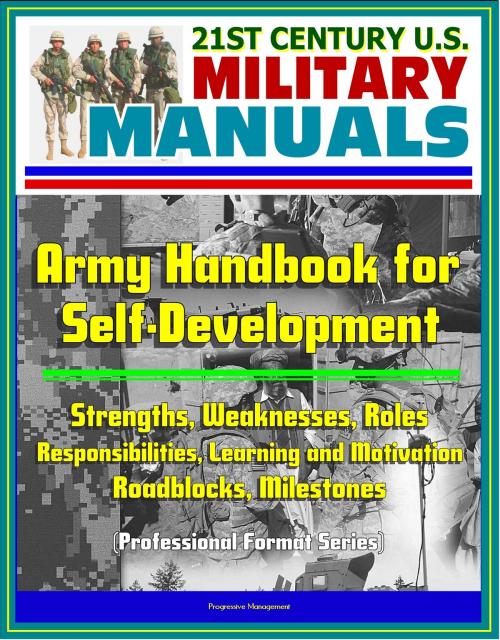21st Century U.S. Military Manuals: Army Handbook for Self-Development - Strengths, Weaknesses, Roles, Responsibilities, Learning and Motivation, Roadblocks, Milestones (Professional Format Series)
Nonfiction, Health & Well Being, Self Help, Self Improvement, Creativity, History, Military, United States| Author: | Progressive Management | ISBN: | 9781301163489 |
| Publisher: | Progressive Management | Publication: | February 4, 2013 |
| Imprint: | Smashwords Edition | Language: | English |
| Author: | Progressive Management |
| ISBN: | 9781301163489 |
| Publisher: | Progressive Management |
| Publication: | February 4, 2013 |
| Imprint: | Smashwords Edition |
| Language: | English |
Professionally converted for accurate flowing-text e-book format reproduction, this Army publication draws on lessons from the field, educational and leadership research, and applicable Army regulations and doctrine to provide you with state-of-the-art guidance on designing and implementing your own program of self-development.
There are three types of self-development:
• Structured Self-Development: Required learning that continues throughout your career and that is closely linked to and synchronized with classroom and on-the-job learning.
• Guided Self-Development: Recommended but optional learning that will help keep you prepared for changing technical, functional, and leadership responsibilities throughout your career.
• Personal Self-Development: Self-initiated learning where you define the objective, pace, and process.
The contents of this handbook will help you perform all three types of self-development. If you are pursuing personal self-development, this handbook offers exercises and information you can use to determine your self-development direction and start immediately working toward it. If you already have a direction for your self-development, the handbook will help you achieve progress in that direction.
Wherever you find yourself in the journey for professional growth, this handbook is organized to assist with:
• Recognizing strengths and weaknesses (What are you good and not so good at?)
• Setting or confirming self-development direction (Where should you go?)
• Making the most of learning opportunities (How do you learn?)
• Measuring progress and continuing to move forward (How well are you doing?)
CONTENTS * IDENTIFY YOUR STRENGTHS AND WEAKNESSES * Collect Information From Formal Assessments * Gather Feedback From Others * Exercise: Watch How Others Act Toward You * Asking for Feedback * Perform a Self-Exam * Exercise: Do a Situation Analysis * Exercise: Do a Self-Analysis * Identify Your Strengths and Weaknesses * WHERE SHOULD I GO? * Gather Information to Decide Where You Should Go * Roles and Responsibilities * Exercise: Analyze Your Roles and Responsibilities * Needs of the Army * Exercise: Consider the Needs of the Army * Set Your Self-Development Direction * Plan Milestones to Keep You on Track * Exercise: Plan to Meet Your Milestone * HOW DO I LEARN? * Be Motivated and Persistent * Make the Most of Learning Opportunities * Use Effective Learning Methods * General Learning Principles * Principles for Specific Types of Learning * Practice Deep Processing * Learn Effectively From Written Materials * Expanding Your Reading * Journal Your Learning * HOW DO I MOVE FORWARD? * Let Your Milestones Guide You * Overcome Self-Development Roadblocks * Internal Roadblocks * External Roadblocks * Work Efficiently * Maintain Forward Momentum * Assess Your Progress * Make Course Corrections * Set Your Next Milestone * Exercise: Set Your Next Milestone * Self-Development Throughout Your Career
Professionally converted for accurate flowing-text e-book format reproduction, this Army publication draws on lessons from the field, educational and leadership research, and applicable Army regulations and doctrine to provide you with state-of-the-art guidance on designing and implementing your own program of self-development.
There are three types of self-development:
• Structured Self-Development: Required learning that continues throughout your career and that is closely linked to and synchronized with classroom and on-the-job learning.
• Guided Self-Development: Recommended but optional learning that will help keep you prepared for changing technical, functional, and leadership responsibilities throughout your career.
• Personal Self-Development: Self-initiated learning where you define the objective, pace, and process.
The contents of this handbook will help you perform all three types of self-development. If you are pursuing personal self-development, this handbook offers exercises and information you can use to determine your self-development direction and start immediately working toward it. If you already have a direction for your self-development, the handbook will help you achieve progress in that direction.
Wherever you find yourself in the journey for professional growth, this handbook is organized to assist with:
• Recognizing strengths and weaknesses (What are you good and not so good at?)
• Setting or confirming self-development direction (Where should you go?)
• Making the most of learning opportunities (How do you learn?)
• Measuring progress and continuing to move forward (How well are you doing?)
CONTENTS * IDENTIFY YOUR STRENGTHS AND WEAKNESSES * Collect Information From Formal Assessments * Gather Feedback From Others * Exercise: Watch How Others Act Toward You * Asking for Feedback * Perform a Self-Exam * Exercise: Do a Situation Analysis * Exercise: Do a Self-Analysis * Identify Your Strengths and Weaknesses * WHERE SHOULD I GO? * Gather Information to Decide Where You Should Go * Roles and Responsibilities * Exercise: Analyze Your Roles and Responsibilities * Needs of the Army * Exercise: Consider the Needs of the Army * Set Your Self-Development Direction * Plan Milestones to Keep You on Track * Exercise: Plan to Meet Your Milestone * HOW DO I LEARN? * Be Motivated and Persistent * Make the Most of Learning Opportunities * Use Effective Learning Methods * General Learning Principles * Principles for Specific Types of Learning * Practice Deep Processing * Learn Effectively From Written Materials * Expanding Your Reading * Journal Your Learning * HOW DO I MOVE FORWARD? * Let Your Milestones Guide You * Overcome Self-Development Roadblocks * Internal Roadblocks * External Roadblocks * Work Efficiently * Maintain Forward Momentum * Assess Your Progress * Make Course Corrections * Set Your Next Milestone * Exercise: Set Your Next Milestone * Self-Development Throughout Your Career















